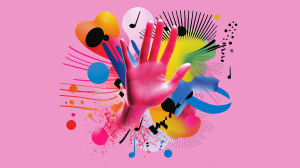How much do we listen to or move our body when we learn how to play music? Embodiment in music holds that music cognition is strongly determined by the way our body interacts with music. While studies have shown that body movements influence the way we learn, teach and perform music, this paradigm still presents scientific challenges to be resolved.
To address this gap, music education scholar Luc Nijs, electrical engineering scientist Ines Chihi, and computer scientist Luis A. Leiva launched the groundbreaking research project SAMUSE – Skills Acquisition in Music performance through a Multi-Sensing approach.
To this end, researchers will introduce a combined approach based on multiple sensors and a development-oriented framework for multiple skill levels in the study of skill acquisition in music performance. The study aims to define the psychophysiological parameters that change over time in relation to the different skill acquisition levels. By conducting a focused cross-sectional study, the physical, cognitive, and emotional engagement of musicians will be measured at different skill levels.
To further advance this research, the engineering researchers on the team will focus on the development of wearable and flexible sensors. These innovative sensors can be seamlessly incorporated into clothing and accessories. According to Ines Chihi, “for music performance research, such sensors offer the potential to revolutionise music performance research, by enabling a comprehensive measurement sensor matrix of biomedical properties and integrating a wide range of data, including gestures and physiological responses. This multidimensional approach allows for a deeper understanding of the interplay between physical and physiological factors in music performance education, ultimately leading to more refined training techniques and performance analytics.”
As explained by Prof. Leiva, “from a scientific perspective, SAMUSE will contribute novel multimodal machine learning models that have potential to change how musicians approach modern education. These models also have potential to be applied to other domains that work with high-throughput data such as in sports, bioinformatics, or network systems.”
The project will support further research on the design and evaluation of novel music educational approaches based advanced digital monitoring applications. From an engineering standpoint, the project’s objective is to develop innovative, smart, wearable, and flexible sensors designed for data collection during music performance. These sensors would prioritise user comfort, ease of use, efficiency, and environmental sustainability.

Opportunities for music multisensing applications.
The researchers will combine their expertise to develop quantitative methods, informed by AI modelling approaches, to characterise different skill levels in music performance. This will facilitate a deeper understanding the music skill acquisition continuum and consequently, enable the design of more effective learning paths. “This project will contribute to novel measurement and analysis methods in music performance research, allowing a more advanced and sophisticated characterisation of skill levels in music performance”, explains Prof. Luc Nijs. “The overall goal is a research-based professionalisation of instrumental music education.”
Doctoral candidates Laura Serra Marin (Department of Education and Social Work), and Hajer Gammoudi of the Department of Engineering will be part of the project.
Research funded by the Institute for Advanced Studies
The project SAMUSE – Skills Acquisition in Music performance through a Multi-Sensing approach is fully funded by the Institute for Advanced Research (IAS). The IAS is the University’s funding programme for interdisciplinary, audacious and frontier research projects.
